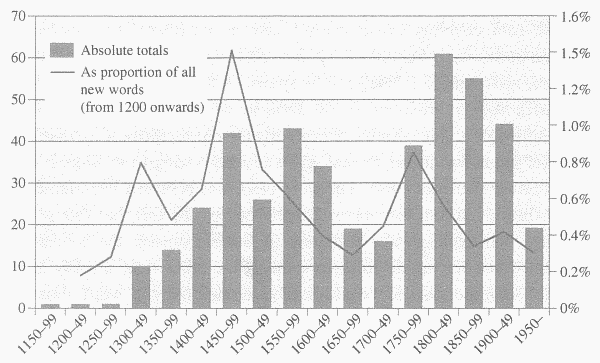昨日の記事「#2645. オランダ語から借用された馴染みのある英単語」 ([2016-07-24-1]) 及び「#148. フラマン語とオランダ語」 ([2009-09-22-1]),「#149. フラマン語と英語史」 ([2009-09-23-1]) で取り上げてきたように,オランダ語と関連変種(フラマン語,低地ドイツ語,アフリカーンス語などを含み,オランダ語とともにすべて合わせて "Low Dutch" と呼ばれる)から英語に入った借用語は案外と多い.Durkin による OED3 による部分的な調査によれば,これらの言語からの借用語にまつわる数字を半世紀ごとにまとめると,以下のようになる (Durkin, p. 355 の "Loanwords from Dutch, Low German, and Afrikaans, as reflected by OED3 (A--ALZ and M-RZZ)" と題する表を再現した).

英語史を通じての全体的な数だけでいえば,Low Dutch からの借用語は,実に古ノルド語からの借用語よりも数が多いというのは意外かもしれない.「#126. 7言語による英語への影響の比較」 ([2009-08-31-1]) の表では,Dutch/Flemish からの語彙的影響は "minimal" と表現されているが,実際にはもう少し高めに評価する表現であってもよさそうだ.ただし,古ノルド語ほど英語の基本語彙に衝撃を与えたわけではなく,数だけで両ケースを比較することには注意しなければならない.ただし,Low Dutch からの語彙借用に関して顕著な特徴として,中世から現代まで途切れることなく語彙を供給している点は指摘しておきたい.
時代別にみると,借用語の絶対数では中世の合計は近現代の合計を下回るが,割合としては特に後期中英語に借用が盛んだったことがよくわかる.英語本来語と Low Dutch からの借用語とは語源的,形態的に区別のつかないことも多く,実際には古英語でも少なからぬ借用があった可能性があると想像すると,Low Dutch 借用語のもつ英語史上の潜在的な意義は小さくないように思われる.
Low Dutch 借用語の統計の問題について,Durkin (356--57) は次のように議論している.
The fullest study of words of Dutch or Low German origin in English remains that of Bense (1939), who drew his data chiefly from the first edition of the the (sic) OED. Bense's study groups loanwords from Dutch and Low German together under the collective heading 'Low Dutch', although at the level of individual word histories he frequently distinguishes between input from each language. His companion work, Bense (1925), provides a summary of the main historical contexts of contact. Bense discusses over 5,000 words, for most of which he considers Low Dutch origin at least plausible; this is thus much higher than the OED's etymologies suggest. His total includes some words ultimately of Dutch origin that have definitely entered English via other languages, e.g. plaque (from a French word that ultimately has a Dutch origin), and also many semantic loans; OED3 has over 150 of these in parts so far revised, e.g. household (a. 1399) or field-cornet (1800, after South African Dutch veldkornet). Nonetheless, Bense does make a case for direct borrowing from Dutch for many words for which the OED does not posit a Dutch etymon; even if one agrees with the OED's (generally more conservative) approach in all cases, Bense's suggestions are by no means absurd, and his work highlights very well the difficulty of being certain about the extent of the Dutch contribution to the lexis of English.
5000語を超えるという Bense の試算はやや大袈裟であっても,概数としては馬鹿げていないのではないかという Durkin の評価も,なかなか印象的である.
・ Durkin, Philip. Borrowed Words: A History of Loanwords in English. Oxford: OUP, 2014.
・ Bense, J. F. Anglo-Dutch Relations from the Earliest Times to the Death of William the Third. Den Haag: Martinus Nijhoff, 1925.